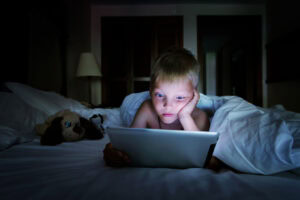Screening Screen Time
Screens surround us almost everywhere we go. As we enter fall with its more hectic pace, including a new school year for some, our time becomes more limited. Start now with a healthy screen-time diet to avoid overconsumption and its negative effects on everything from mental/physical health to finances. Pottstown Area Health & Wellness Foundation (PAHWF) offers guidance.
Customize Screen Time

Although standard limits have been devised by a variety of healthcare organizations, remember they are only guidelines. We know ourselves and our families better than any study can generalize. Perhaps you feel lonely after cruising social media or your eyes burn after working overtime on the computer. We do not need an expert with statistics to confirm these issues are the outcome of too much screen time—even if you haven’t met the standard daily quota.
However, if your middle-schooler is home sick or your teen is tired after soccer camp, screen time might be a healthy distraction and a way to relax. Allowing extra screen time may be acceptable in these situations, despite the clock ticking on recommendations. If your kids were playing outside all day, unwinding with a movie or extra online gaming can be a healthy balance. You know best. Trust your judgment.
Set Screen-Time Boundaries as a Family
Suggest your older teens take note of how screen time affects them. At this age, they should be responsible for creating their own healthy lifestyle. By independently realizing social media can make one feel more left out than included, they are more likely to create and comply with self-imposed restrictions. Help them learn self-awareness.
Share what you learn about your own screen habits. A casual conversation about balancing screen time with “real-life time” can have a positive impact, with improved results. Relying only on the omnipresent parental controls, especially with older teens, can exacerbate the issue.
Learn Life Balance Young, Including on Screens
Healthy habits should begin at an early age. Introduce your children to active hobbies, fun activities, the beauty of nature, and the deliciousness of healthful food. Teach them limits, starting from their first experience with screens. Twenty minutes of educational TV can be swapped out for mobile gadget time if you need to run an errand. Help them understand what balance looks like.
As they get older, knowing they have choices will be empowering. Offer options, along with an opportunity to make confident decisions; for example, video game after school or cartoons after dinner. Let it be an early lesson in time management and decision making.
As kids mature, teach them the impact screen time has on health. Some common problems associated with excessive screen use include:
- Lack of sleep
- Joint and muscle pain from poor posture (neck, shoulders, back) and repetitive motions (fingers, wrists, hands)
- Obesity from a sedentary lifestyle
- Hearing loss from high-volume audio in headphones
- Depression and anxiety from social media
- Limited attention span
- Vision troubles
- Trouble budgeting money when products dazzle in the instant gratification of online shopping
When informing, do not threaten with comments like, “If you don’t stay off your screen, you’re going to get fat.” Instead, try, “It’s a sunny day outside, put down your phone and take a walk with me. It’ll help your muscles grow strong. Your body is happy when it moves.” Or, for teens, “Log off Instagram for a few hours. Your friends will wonder what you’re up to—and we can go out for ice cream.” Make your comments caring and age appropriate.
Go Bike!
Today’s youth are not riding bikes as often as previous generations. Bike Pottstown/Bike Schuylkill is helping change that with a free Community Bike Share program managed by the Schuylkill River Heritage Area. Anyone age 16 years or older can borrow an adult bike with a driver’s license or other valid state ID. (Younger kids will need to bring their own bikes.) Explore Schuylkill River Greenways, a grantee of PAHWF, for beautiful pathways. Healthy fun! This initiative gets everyone away from screens while simultaneously counteracting screen time with exercise to build confidence, reduce stress, and increase focus.
Regular exercise, in general, is a good way to balance screen time. You accomplish everything screen time lacks—movement, whole-being engagement, focus, and often socialization. Outdoor activity increases the healthful benefits. PAHWF shares research on the brain-body connection, including the benefits of exercise on academic performance.[Diane, the links on this PAHWF page do not work.] Of course, we all love a good Netflix night. However, the more we learn, the less screen time has any appeal.
Outside of work and school, screen time should accommodate your life not the reverse. If you find yourself a servant to your devices, it is time to make an immediate change—before your mind, body, and relationships suffer.
If you are struggling, PAHWF shares mental health resources. You are never alone. Step away from the screen and connect with the world.
